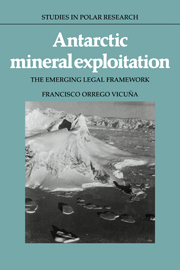Book contents
- Frontmatter
- Contents
- Preface
- Acknowledgement
- Abbreviations
- Part I The international legal framework of Antarctic co-operation and the development of resources
- Part II Alternative approaches to the conservation and development of Antarctic minerals: the process of internal accommodation
- Part III Issues and options relating to the external accommodation
- 9 Participation of States other than the Consultative Parties in the Antarctic Treaty system
- 10 The Antarctic Treaty system and the international community
- 11 Conclusions
- Appendix 1 The Antarctic Treaty
- Appendix 2 Table of signatures and ratifications
- Table of Cases
- Table of Statutes and national legislation
- Table of Treaties
- Bibliography
- Index
10 - The Antarctic Treaty system and the international community
Published online by Cambridge University Press: 04 November 2009
- Frontmatter
- Contents
- Preface
- Acknowledgement
- Abbreviations
- Part I The international legal framework of Antarctic co-operation and the development of resources
- Part II Alternative approaches to the conservation and development of Antarctic minerals: the process of internal accommodation
- Part III Issues and options relating to the external accommodation
- 9 Participation of States other than the Consultative Parties in the Antarctic Treaty system
- 10 The Antarctic Treaty system and the international community
- 11 Conclusions
- Appendix 1 The Antarctic Treaty
- Appendix 2 Table of signatures and ratifications
- Table of Cases
- Table of Statutes and national legislation
- Table of Treaties
- Bibliography
- Index
Summary
First proposals for internationalization
The academic and diplomatic debate which has been going on throughout the present century about the legal status of Antarctica and the possible forms of international co-operation therein, has been generally dominated by proposals for various forms of internationalization of the continent or for the establishment of some sort of linkage with the international community in a broad sense. The ideas expressed by Fauchille in 1925 concerning the participation of all States in the exploitation of the wealth of Antarctica have been a recurrent theme in this debate.
The wide range of proposals put forward before the Antarctic Treaty was concluded may be classified into three main categories. The first refers to the establishment of international machinery for the organization of co-operation in Antarctica which would, in general, be restricted to the countries directly concerned. This type of proposal implies a limited degree of internationalization, but not to such a generalized extent as in other schemes. Proposals for the establishment of a Permanent International Commission for Antarctica and those aimed at ensuring the internationalization or demilitarization of the continent fall within this category.
A second category of proposals envisaged forms of internationalization based on functional criteria, implying co-operation in specific spheres of activity. Jenk's proposal for the establishment of common international services for Antarctica comes within this category.
- Type
- Chapter
- Information
- Antarctic Mineral ExploitationThe Emerging Legal Framework, pp. 458 - 518Publisher: Cambridge University PressPrint publication year: 1988

